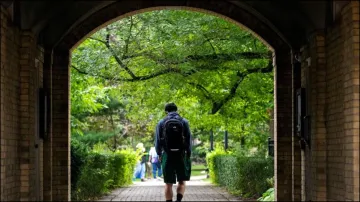Canada: British Columbia places two-year ban on new colleges enrolling international students
British Columbia's Post-Secondary Education Minister Selina Robinson said the step was required to improve the state of education in schools. This came after Canada imposed a temporary, two-year cap on student visas, which will result in the issue of about 3,64,000 visas in 2024.

British Columbia: The Canadian province of British Columbia will ban new colleges from applying to enroll international students for the next two years as it seeks to control a surge of immigration, which has created a shortage of rental units and an increase in nationwide rents. The province will now set minimum language requirements at private training institutions and also set higher standards for labour market needs and degree quality.
British Columbia's Post-Secondary Education Minister Selina Robinson said on Monday that the freeze is necessary to correct faults in an international education system that "has not been working as well as it should", reported CBC News. Robinson said provincial authorities found instances of "poor-quality education, lack of instructors" and even the "scaring away" of students from lodging formal complaints by certain private institutions.
One student told Robinson that her family in India saved money to send her to British Columbia for "quality education", but she was instead placed in online classes upon arrival, the minister said. "She arrived here being told that there would be in-class instruction, only to discover on her first day of class as she showed up that the entire course would be taught online. And she couldn't understand why she spent all that money for an online program," Robinson added.
This came after Justin Trudeau's government introduced a temporary, two-year cap on student visas, which will result in the issue of about 3,64,000 visas in 2024. The permits were previously seen as an easy path to securing permanent residency. The surge of international students led to an acute shortage in rental apartments, which pushed up rents. In December, rents nationwide rose 7.7% from a year earlier, according to Statscan.
Prime Minister Trudeau's popularity has been dented mainly due to the affordability crisis, and opposition Conservative Party leader Pierre Poilievre has taken a commanding lead over Trudeau in opinion polls ahead of an election next year. Apart from the rental crisis, the government has also been concerned about the quality of education provided by some of the institutions.
International students in British Columbia
Out of the 175,000 international post-secondary students from more than 150 countries in British Columbia, about 54 per cent are enrolled in private institutions. There are 280 of those private schools in the province, and 80 per cent of them are in the Lower Mainland.
Robinson further detailed policies to strengthen inspections of the schools to make sure that certain standards are maintained so that students are not taken advantage of. "They worry that if they complain, it will risk their student visa, and it will sacrifice all the effort their families have put into making sure they can get a quality education," she said.
The Canadian Minister further said the two-year pause gives the province some time to assess the impact of recent changes, such as the federal government's capping of study permits it approves over the next two years. Additionally, British Columbia Premier David Eby said it is crucial that the province correct the issues in the international education system.
"There are a wide array of private institutions, big and small in our province, but regardless of the size of the institution, our expectations of the level of quality are the same," he said in Ottawa. "There are institutions that are not meeting our expectations right now."
Impact of student visa cap in Canada
International students contribute about C$22 billion ($16.4 billion) annually to the Canadian economy. The move will hurt many educational institutions that had expanded their campuses in the hope of a continued inflow of students. The vast majority, about 40%, of foreign students in Canada come from India, with China coming in second with about 12%, according to official data from 2022.
Ontario, the most populous province, received the biggest share of international students. Some businesses, including restaurants and retail sectors, have warned that a cap on foreign students will create a shortage of temporary workers. Restaurants across Canada are grappling with labour shortages with nearly 1,00,000 vacancies, and international students made up 4.6 per cent of 1.1 million workers in the food service industry in 2023, according to a lobby group.
A great number of Indian students who are willing and were moved to Ottawa belong to Punjab state. A maximum number of students visit Canada for higher studies and work. The ongoing India-Canada diplomatic tensions have already affected the flow of Indian students to Ottawa. Now, with the latest measure, it would impact the Indian students willing to continue their further studies abroad.
(with inputs from Reuters)
ALSO READ | India is cooperating with Canada on Nijjar probe, bilateral ties improving: Ex-Canadian NSA